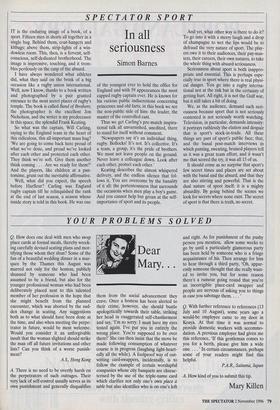SPECTATOR SPORT
In all seriousness
Simon Barnes
IT is the enduring image of a book, of a sport. Fifteen men in shorts all together in a single hug. Behind them, coat-hangers and kitbags; above them, strip-lights of a win- dowless room. This, then, is a fervent, self- conscious, self-dedicated brotherhood. The image is impressive, touching, and it trem- bles perilously on the cusp of the absurd.
I have always wondered what athletes did, what they said on the brink of a big occasion like a rugby union international. Well, now I know, thanks to a book written and photographed by a pair granted entrance to the most secret places of rugby's temple. The book is called Band of Brothers; the photographer is the excellent Jon Nicholson, and the writer is my predecessor in this space, the splendid Frank Keating.
So what was the captain, Will Carling, saying to the England team in the heart of this ridiculous, this all-important mass hug? `We are going to come back here proud of what we've done, and proud we've looked after each other and protected each other. They think we're soft. Give them another think coming . . . Are we ready for them?' And the players, like children at a pan- tomime, grunt out the inevitable affirmative.
Well, what did you expect, the speech before Harfleur? Carling was England rugby captain till he relinquished the rank at the end of last season, a season whose inside story is told in this book. He was one of the youngest ever to hold the office for England and with 59 appearances the most capped rugby captain ever. He is known for his various public indiscretions concerning princesses and old farts; in this book we see the non-public side of him: the leader, the master of the controlled rant.
Thus we get Carling's pre-match inspira- tional talk all unvarnished, unedited, there to stand for itself without comment.
`Newspapers say it's an individual thing, rugby. Bollocks! It's not. It's collective. It's a team, a group, it's the pride of brothers. We must not leave people on the ground. Never leave a colleague down. Look after each other, protect each other.'
Keating describes the almost whispered delivery, and the endless silence that fol- lows it. You are overcome by the banality of it all: the portentousness that surrounds the occasions when men play a boy's game. And you cannot help but groan at the self- importance of sport and its people. And yet, what other way is there to do it? To go into it with a merry laugh and a drop of champagne to wet the lips would be to defraud the very nature of sport. The play- ers owe it to their audiences, their pay-mas- ters, their careers, their own natures, to take the whole thing with absurd seriousness.
Seriousness about sport is both inappro- priate and essential. This is perhaps espe- cially true in sport where there is real physi- cal danger. You go into a rugby interna- tional not at the risk but in the certainty of getting hurt. All right, it is not the Gulf war, but it still takes a bit of doing.
We, as the audience, demand such seri- ousness because sport that is not seriously contested is not seriously worth watching. Television, in particular, demands intensity: it portrays ruthlessly the elation and despair that is sport's stock-in-trade. All these things are part of sport's public face; that, and the banal post-match interviews in which panting, sweating, bruised players tell us it was a great team effort, and it wasn't me that scored the try, it was all 15 of us.
It should come as no surprise that sport's few secret times and places are set about with the banal and the absurd, and that they are also stirring and powerful. That is the dual nature of sport itself: it is a mighty absurdity. By going behind the scenes we look for secrets where none exist. The secret of sport is that there is truth, no secret.


















































































 Previous page
Previous page